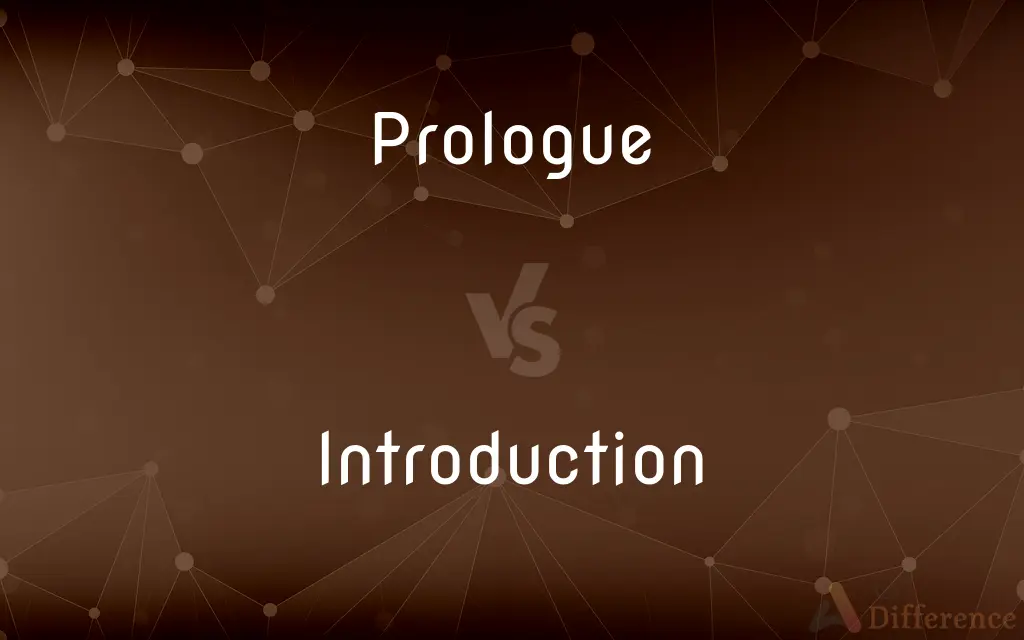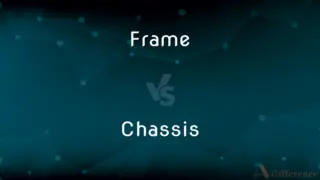Prologue vs. Introduction — What's the Difference?
Edited by Tayyaba Rehman — By Fiza Rafique — Updated on October 6, 2023
A prologue sets the stage in fiction, often providing backstory. An introduction explains the purpose or context of non-fiction works, guiding readers into the main content.

Difference Between Prologue and Introduction
Table of Contents
ADVERTISEMENT
Key Differences
The terms prologue and introduction, while sometimes used interchangeably, carry distinct meanings in literature and writing. A prologue often finds its place in fictional works. It provides readers with a glimpse into the story's background, setting the stage or offering essential context. Prologues might introduce key characters, events, or settings that are crucial to understanding the narrative that follows.
On the other hand, an introduction is predominantly associated with non-fiction works. Its primary function is to present the subject or topic of the book or article, explaining its significance or relevance. Through introductions, authors might also establish their viewpoint or approach to the topic, helping readers to understand what to expect from the ensuing chapters or sections.
While prologues can have a narrative or story-like quality, drawing readers into the fictional world, introductions often adopt a more direct and explanatory tone. They might outline the structure of the work, summarize its content, or highlight its primary objectives.
Moreover, it's essential to recognize that not all works have a prologue or introduction. Their inclusion depends on the writer's intention and the work's structure. Whether setting a scene in a novel with a prologue or clarifying a thesis in an academic paper with an introduction, both serve to engage and prepare the reader.
Comparison Chart
Associated with
Fictional works
Non-fiction works
ADVERTISEMENT
Purpose
Provides background or sets the stage
Explains the purpose or context
Content
Narrative or story-like
Explanatory, often direct
Position
Typically at the beginning of a book
Usually precedes main content or chapters
Tone
Can be varied, depending on story
Informative, guiding the reader
Compare with Definitions
Prologue
A section in a play or book before the main plot.
The prologue introduced the feud between two families.
Introduction
The beginning section in a book that explains its purpose.
The introduction outlined the book's objectives.
Prologue
A distinct introductory section.
The prologue set the tone for the ensuing drama.
Introduction
An opening that establishes context or background.
The introduction gave a brief history of the subject.
Prologue
A narrative that provides a foundation for the main story.
The prologue recounted events a decade before the main storyline.
Introduction
The act or process of introducing or the state of being introduced.
Prologue
An introduction or preface, especially a poem recited to introduce a play.
Introduction
A means, such as a personal letter, of presenting one person to another.
Prologue
An introduction or introductory chapter, as to a novel.
Introduction
Something recently introduced; an innovation
"He loathed a fork.
It is a modern introduction which has still scarcely reached common people" (D.H. Lawrence).
Prologue
An introductory act, event, or period.
Introduction
A preface, as to a book.
Prologue
A speech or section used as an introduction, especially to a play or novel.
Introduction
(Music) A short preliminary passage in a larger movement or work.
Prologue
One who delivers a prologue.
Introduction
A basic introductory text or course of study.
Prologue
(computing) A component of a computer program that prepares the computer to execute a routine.
Introduction
The act or process of introducing.
The introduction of a new product into the market
Prologue
(cycling) An individual time trial before a stage race, used to determine which rider wears the leader's jersey on the first stage.
Introduction
A means, such as a personal letter, of presenting one person to another.
David was feeling groggy at his introduction to Sophie, and didn't remember her name.
Prologue
To introduce with a formal preface, or prologue.
Introduction
An initial section of a book or article, which introduces the subject material.
This book features a preface by a well-known botanist, and an introduction by the author's mentor at university.
Prologue
The preface or introduction to a discourse, poem, or performance; as, the prologue of Chaucer's "Canterbury Tales;" esp., a discourse or poem spoken before a dramatic performance
Introduction
A written or oral explanation of what constitutes the basis of an issue.
Prologue
One who delivers a prologue.
Introduction
The act of introducing, or bringing to notice.
Prologue
To introduce with a formal preface, or prologue.
Introduction
The act of formally making persons known to each other; a presentation or making known of one person to another by name; as, the introduction of one stranger to another.
Prologue
An introduction to a play
Introduction
That part of a book or discourse which introduces or leads the way to the main subject, or part; preliminary; matter; preface; proem; exordium.
Prologue
A preliminary discourse in a story.
The prologue hinted at the protagonist's tragic past.
Introduction
A formal and elaborate preliminary treatise; specifically, a treatise introductory to other treatises, or to a course of study; a guide; as, an introduction to English literature.
Prologue
An opening to a story that establishes context.
The prologue described the ancient world where the tale was set.
Introduction
The first section of a communication
Introduction
The act of beginning something new;
They looked forward to the debut of their new product line
Introduction
Formally making a person known to another or to the public
Introduction
A basic or elementary instructional text
Introduction
A new proposal;
They resisted the introduction of impractical alternatives
Introduction
The act of putting one thing into another
Introduction
The act of starting something for the first time; introducing something new;
She looked forward to her initiation as an adult
The foundation of a new scientific society
He regards the fork as a modern introduction
Introduction
A preliminary explanation, usually in non-fiction.
The introduction provided context for the research.
Introduction
A segment that leads into the main content.
The introduction highlighted the main topics covered.
Introduction
A presentation of the topic or thesis.
The introduction stated the author's stance on the issue.
Common Curiosities
Can a non-fiction book have a prologue?
While less common, non-fiction works can sometimes have a prologue.
Can a book have both a prologue and an introduction?
Yes, especially if it's a fictional work with supplemental non-fiction content.
Is a prologue considered part of the main story?
It's separate but provides context or background for the main story.
Is a prologue common in all fiction books?
No, not all fiction books have a prologue. It's the author's choice.
Which is more narrative: a prologue or an introduction?
Prologues tend to be more narrative, while introductions are explanatory.
How long is a typical introduction?
Length varies, but it's typically concise, offering a glimpse into the content.
Is an introduction always at the beginning?
Typically, yes. An introduction sets the stage for the main content.
What comes first, the prologue or the introduction?
Typically, the prologue comes first if a work contains both.
Should all academic papers have an introduction?
Generally, yes. Introductions clarify the paper's aim and scope.
Can a prologue be written by someone other than the main author?
Rarely. However, forewords or prefaces can be written by different individuals.
Is an introduction the same as an abstract?
No, an abstract is a summary, while an introduction establishes context.
Are prologues always set in the past?
Not always, but they often provide backstory or events leading to the main plot.
Is it essential to read the introduction in non-fiction?
While not mandatory, it's recommended for understanding context and approach.
Share Your Discovery

Previous Comparison
Frame vs. Chassis
Next Comparison
Condensation vs. HydrolysisAuthor Spotlight
Written by
Fiza RafiqueFiza Rafique is a skilled content writer at AskDifference.com, where she meticulously refines and enhances written pieces. Drawing from her vast editorial expertise, Fiza ensures clarity, accuracy, and precision in every article. Passionate about language, she continually seeks to elevate the quality of content for readers worldwide.
Edited by
Tayyaba RehmanTayyaba Rehman is a distinguished writer, currently serving as a primary contributor to askdifference.com. As a researcher in semantics and etymology, Tayyaba's passion for the complexity of languages and their distinctions has found a perfect home on the platform. Tayyaba delves into the intricacies of language, distinguishing between commonly confused words and phrases, thereby providing clarity for readers worldwide.
















































